Sober Living For Cocaine Addiction | Asheville, NC


Get in Touch With Us

Sober living for cocaine addiction is a crucial form of aftercare when recovering from this very dangerous disorder. Unfortunately, thousands of people are still lured to Cocaine, even though it is well known to be addictive. 1,800 Americans try Cocaine for the first time each day, and many of them are unable to break their habit.
After treatment for cocaine addiction ends, people must choose whether to return to their previous environments or move to a sober living facility. Sobriety and recovery are critical for maintaining long-term sobriety. Continue reading to learn more about the detrimental consequences of cocaine addiction, the advantages of sober living, and much more.
Cocaine Use in the United States
When cocaine abuse started to rise in the 1970s, many people considered the expensive powdered form of the drug to be glamorous and relatively safe. At first, recreational cocaine use was restricted to relatively wealthy and successful segments of society. As the price of powdered cocaine dropped over the years and crack cocaine, a cheap smoked form of the drug, came onto the market, the illicit cocaine industry expanded into poor urban communities.
According to the National Survey on Drug Use and Health, 5.2 million people (1.9%) reported using cocaine over the past 12 months in 2020. Of these, 1.3 million people (0.5%) had a cocaine use disorder. Approximately 19,447 people died from a cocaine overdose in 2020. The graph below shows that cocaine, among almost every other drug of abuse, has been responsible for a dramatic increase in overdose fatalities.

Dangers of Cocaine Addiction
Research has identified heart-related problems as the most frequent cause of death among cocaine addicts. Sudden death as a result of cocaine use is one of the potential consequences. In addition to being at higher danger of heart disease because of the drug’s effects on the cardiovascular system, cocaine users are at higher risk of sudden death. However, cocaine use makes the cardiovascular system work harder, which constricts blood vessels, raises blood pressure, and results in an increased risk of heart problems including heart attack, heart failure, and other cardiovascular complications.
Seizures, heart failure, respiratory failure, cerebral hemorrhage, and/or strokes are among the cocaine side effects that can occur when the drug is combined with other substances. No medicines are available to “save” a cocaine user who accidentally overdoses. In many cases, overdose leads to lifelong brain damage and/or impaired cognitive and/or physical function or death. Using large amounts of cocaine in a short period of time, medical problems, and using other illegal substances at the same time all contribute to overdose. There is some evidence to suggest that injecting drugs and smoking cocaine produce a higher risk of overdose than snorting the substance.
Many people consider cocaine to be relatively harmless; however, using this drug in excess or frequently can result in a variety of unpleasant and even life-threatening effects. This substance may cause:
- Hallucinations
- Rapid heartbeat
- Feelings of invincibility
- Irritability
- Anxiety
- Heart attack
- Stroke
- Overdose
The intense and short-lived stimulation provided by cocaine is responsible for its high potential for abuse. Because abusers develop tolerance to cocaine’s effects rapidly and must take increasingly large doses of the drug more frequently to achieve the same intensity high, addiction and dependence result.
Signs That You Have a Cocaine Addiction

Recognizing a cocaine addiction can be difficult, but there are certain signs that may indicate an addiction. Craving cocaine and ignoring the repercussions that come with it are indications of addiction. Even though there are significant physical manifestations of addiction, psychological addiction is often the most difficult to overcome.
Someone who uses cocaine frequently will develop a dependency on it and will feel uncomfortable if they do not get it. As a result of an addiction, a tolerance to cocaine will develop, and withdrawal symptoms will appear if they stop using it. Once someone has become addicted to cocaine, it is often challenging to stop. This is because cocaine profoundly increases the amount of dopamine in the brain, altering the reward system as a result. The following are signs of cocaine addiction:
- Chronic nosebleeds
- Financial struggles
- Mood swings
- Aggression
- Intense cravings
- Insomnia
- Anxiety
- Weight loss
- Legal trouble
- Indifference towards activities once enjoyed
- Participation in risky or illegal behavior
- Nose damage
- Wanting to quit but being unable to
- Withdrawal symptoms when not used

Download Our Free eBook
What is Sober Living?
A sober-living home is a location to live where you’ll find a supportive community and be able to begin your life free from alcohol or other drugs. Substance use is not allowed for residents of sober living homes, who participate in outpatient programs or after completing inpatient treatment.
Having the opportunity to live in a drug and alcohol-free environment after rehab enables you to put what you learned into practice in your day-to-day life. This is where the battle begins in drug and alcohol addiction recovery.
Remember that sober living is your support net as you practice new skills, gain new insight, and build a fresh life in recovery with other individuals who are probably facing the same difficulties. A sober living home can provide you with a strong support network and community as you negotiate the tough spots and cravings you may face.
Sober Living Home vs. Inpatient Rehab
Sober living is typically done post-rehab. Unlike a drug rehab center, sober living homes do not have the same structure, clinical supervision, or intensive therapies scheduled within a rehabilitation program. A rehab facility’s primary purpose is to assist addicts in overcoming substance abuse. The National Institute on Drug Abuse categorizes rehabilitation and treatment facilities into four groups based on the method of therapy, whether medication or nonmedication assistance is provided, or the length of the treatment program.
The problem is that people frequently confuse inpatient rehabilitation with short-term residential treatment, where patients are treated in a residence-like rehabilitation center. Rehabilitation and treatment facilities are typically staffed by medical, psychiatric, and/or spiritual professionals and provide a detoxification and recovery program that includes nursing/medical and psychiatric care, nutrition and wellness services, recreational and physical activity, and more.
Benefits of Sober Living for Cocaine Addiction
Once the treatment is complete, people have to decide whether to return to their previous environment or move to a sober living facility. Sobriety living homes are critical in keeping people sober and helping them continue on their recovery journey. Here are some of the benefits you can gain from sober living homes after treatment:
Provide Structure
Having no structure in your sobriety can lead you back to destructive habits. Sobriety living homes offer you the ongoing structure and support you need to recover. Sobriety living homes are managed by individuals who ensure that all residents follow the house’s regulations and guidelines. In addition to enforcing rules, they assist you with issues you might be encountering. You will receive ongoing treatment such as group therapy in the house if you seek recovery housing, but you will also be held accountable for your actions if you’re not held accountable. It’s easy to think whatever you’re doing is okay if you’re not held responsible.
Make Friends
The only relationship that mattered during active addiction was the one between you and your drug of choice. Beginning to develop positive relationships and improve your existence is a possibility once you reside in a sober home. You’ll meet and interact with a variety of individuals in a recovery house, and they will offer you their perspectives on sobriety. These individuals comprehend your prior experiences and the difficulties you face as you attempt not to disappoint your family and friends during your sobriety journey. Instead of confronting these issues on your own, you’ll have others who can assist you.
Learn Life Skills
Your sobriety education will help you develop the life skills you’ll need to survive on your own once you move out of sober living. You neglected your obligations and your health when you were active in your addiction. These life skills are frequently learned through mandatory chores. You will be able to establish a routine for your daily life by completing chores such as doing the laundry, going to the grocery store, or seeking a job. You will also learn interpersonal skills while living with other sober living residents.
Ease the Transition
Going back to daily life after treatment is difficult to do, especially if you’re nervous and scared. Many individuals finishing treatment are anxious and frightened to make the transition back into society because they fear they will not succeed. Sober living, therefore, makes the transition smoother because they know that sober living is a lifelong journey. Sobriety is the connection between treatment and the real world, almost like a protective covering for individuals exiting treatment. By the end of treatment, you will be more self-reliant and rely on yourself rather than others or substances to accomplish your objectives.
Relapse Prevention
The consequences of drug and alcohol abuse are lifelong, both in the short and long term. You may not be able to make the right choices in life if your body and brain have been damaged by drugs or alcohol. You will have less of a chance of relapsing if you stay in recovery housing after treatment because you won’t be surrounded by triggers. If you return home right after treatment, you are likely to be surrounded by triggers that can lead you to use drugs or drink alcohol again. By staying in treatment, you can continue working on your program and practicing the coping skills that you learned. Concentrate on triggers, because they might cause cravings to consume or use substances and can provide opportunities for you to use substances.
What to Expect at a Sober Living House
Patients at inpatient rehab centers are totally immersed in their treatment programs and have little dependence. In sober living homes, residents are not bound to the campus and may come and go as they please. In recovery, individuals feel like they are easing back into normal life and can return to their daily tasks and responsibilities by attending sober living homes. Despite the fact that sober living homes are less stringent than inpatient facilities, they still have curfew and group meeting requirements.
A sober-living home can help you get clean by attending 12-step meetings, creating structure, providing accountability, and creating a sober community. Living in a sober-living home can allow you to make positive connections with other people that will help you stay sober. Those in recovery who return home are often isolated, but a sober-living environment provides an environment to support recovery from substance abuse and addiction. When coming out of rehab, those in rehab can receive the support they need in a sober living home. Living here is both free and structured, so rehab clients can begin to adjust to life outside the clinic. Sober-living homes are specially set up to serve as transitional housing for those coming out of treatment.
Oak Tree Can Help
Men of all ages in Asheville North Carolina can gain the necessary skills for long-term rehabilitation after in-patient care at Oak Tree Recovery Homes. Each day, residents receive supportive care and a caring, safe environment. The 12-step program is used to help clients overcome the barriers that keep them from seeking a life of freedom and choice.
Please get in touch with one of our professionals at Oak Tree Sober Living to find out more about our sober living program. We are here to answer any questions you may have and look forward to helping you live a life free of addiction.